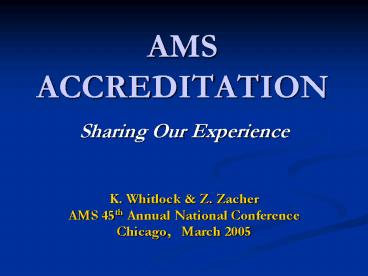AMS ACCREDITATION - PowerPoint PPT Presentation
1 / 18
Title:
AMS ACCREDITATION
Description:
... marketing tool. Provides an external framework to examine professional practices. Careful self-study is an invaluable tool for ... Nardin Academy. The Protocols ... – PowerPoint PPT presentation
Number of Views:112
Avg rating:3.0/5.0
Title: AMS ACCREDITATION
1
AMSACCREDITATION
- Sharing Our Experience
- K. Whitlock Z. Zacher
- AMS 45th Annual National Conference
- Chicago, March 2005
2
What is Accreditation?
- Self-study and documentation process
- An opportunity for a school to reflect on its
practice - A self-evaluation process to define strengths
weaknesses - An avenue for continued growth and improvement
- Formal acknowledgement by an accrediting
association
3
Why is Accreditation Important for a School?
- External recognition as a school of excellence
- Lends credibility to the school
- Is a valuable marketing tool
- Provides an external framework to examine
professional practices - Careful self-study is an invaluable tool for
school improvement - Brings school community together at a new level
4
What is the Accreditation Process
- School completes documentation and self-study
- On-site team visits school
- On-site team sends written report and
recommendation to AMS Accreditation Commission
and school - Review by Accreditation Commission
- Recommendation is forwarded to the AMS Board
5
The Three Protocols
- The Authentic American Montessori School
- The School Portfolio A Self-Study
- Joint Accreditation Protocol
- The school chooses the protocol best suited to
its style - Each protocol defines how you will go about the
process
6
Middle States AssociationandAmerican Montessori
Society
Validating the Vision February 2004 Nardin Academy
7
The Protocols
- The protocols for AMS accreditation are laid out
in the School Improvement Through AMS
Accreditation School Handbook - This can be downloaded from the AMS website
- www.amshq.org
- The next contact is Mimi Basso at the AMS head
office her email address is - Mimi_at_amshq.org
8
Choosing Your Internal Coordinators
Is everyone invested?
Number in team?
Things To Remember
Is there a consensus builder?
Is there a global thinker?
Is there a detail- oriented worker?
Is there a task master?
9
Role of the Internal Coordinator
- Keep the process on-task
- Keep the process moving forward
- Target critical people for various committees
- Create a timeline for the entire process
- Schedule meetings
- Plan agendas
- Synthesizing information
- Communication
10
Identifying the Stakeholders
- Faculty
- Staff
- Business
- Administrative
- Maintenance
- Cleaning
- Development
- Students
- Parents
- Neighbors
- Board
- Alumni
These various constituents will become members of
different committees
11
Respect Your Teams
- Let them know
- Time commitment required
- The timetable for meetings
- That you will always start finish on time
- Be hospitable
- Determine your decision-making model
- Keep everyone informed each step of the way
12
How to Get the Job Done
Communication
Acknowledge individual personality traits
Identify individual strengths
Things To Consider
Identify a springboard issue
Compensation?
How to best utilize time
How to make everyones voice heard
13
The AMS Piece
- Our springboard was 10.5 and 10.6 from the
standards - For Joint Accreditation our AMS self-study
required a narrative of - I. The Educational Nature of the School
- II. The Educational Outcomes of the School
- III. Strategic Plan
- I II are available through
- www.amshq.org
- The Authentic American Montessori School (pp.
35-47)
14
I. The Educational Nature of the School
- The Six Essential Qualities
- Montessori Learning Environment
- Montessoris Learning Activities
- Montessori Learning Relationships
- Montessori Spirituality
- What the Montessori Teacher Is
- What the Montessori Teacher Does
- The Nature of Outcomes
- the descriptions are
- Independence
- Confidence and Competence
- Autonomy
- Intrinsic Motivation
- Ability to Handle External Authority
- Social Responsibility
- Academic Preparation
- Spiritual Awareness
- Citizen of the World
15
II. The Educational Outcomes
- Align student outcomes for each developmental
level with the curriculum and the schools
mission - Describe tools used to measure and report student
outcomes
16
III. Strategic Plan
- Develop long range and short term goals
- Develop an action plan
17
The Ways We Worked
- NDP meeting process
- Small group work
- Personal response/feedback
- Writing team
- Developed questionnaires
- Synthesized work into one voice
18
What We Gained
- Validation
- Focus for the future
- Appreciation for all 3 divisions and the
commonalities between them - Practical action plan
- Became more efficient

